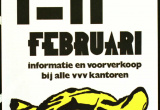’t Hoogt
The first arthouse cinema in the Netherlands was ‘t Hoogt in Utrecht. On 12 January 1973, the cinema was officially opened with the screening of the chaotic, anarchistic film Sho o suteyo machi e deyou (Throw Away Your Books, Rally in the Streets) by Japanese filmmaker Shuji Terayama. The cinema was part of a cultural centre which also included room for theatre, exhibitions and a pub.
The centre was housed in seven historical buildings on the Slachtstraat and ‘t Hoogt was in the city centre. A local architect, A. Oosting, had ingeniously connected the buildings together and in that way kept their monumental character intact. The hotchpotch of stairways, hallways and rooms all contributed to the ‘charm’ of the cultural centre. The cinema seated 49 and featured a 16mm film projector placed prominently in the room. The first director was Huub Bals.
Out from under the NBB
‘t Hoogt was a place where alternative films could be screened in a structural way, supported by council subsidy. This fulfilled the wishes of many cinephiles and political activists who had pleaded for a broader and less commercial range of films. Developments in the 1960s and 1970s had shown that the Netherlands needed a way to distribute and programme films outside of the channels dominated by the Nederlandse Bioscoopbond (NBB). For this reason, Huub Bals had organised a number of noteworthy film events in Utrecht such as Cinemanifestatie, where they screened films by directors whose work had never been seen in the Netherlands before. Independent distributors such as Film International and Cinemien were able to operate on their own without the dominant NBB. The small screening venues started up by film clubs and political organisations over the years joined forces in 1974 to become the Vrije Circuit (Free Circuit).
Film Thrives in Rotterdam
Starting in the 1970s, the Dutch government started to take on more responsibility for helping to foster a healthy and diverse cultural climate. Culture was seen as a means for social reformation and development. Rotterdam’s city council in particular was very active in cultivating an environment where film could thrive. In 1972 it initiated the founding of Film International, which operated both a film festival as well as a distribution division for films that were less commercially viable. This began the development that created a unique circuit of cinemas that showed artistic, cinematographically interesting films.
True to Its Values
‘t Hoogt has expanded into a cinema with 50 screenings a week. Today, the pub is a restaurant and the labyrinth of hallways and rooms has made way for spacious modern auditoriums. The cinema has an educational programme, puts on workshops and holds lectures and retrospectives. Its goals have been adjusted to the spirit of the times, but ‘t Hoogt has remained true to the idealistic principles it started out with: it still screens films of ‘cinematographic value’, finds a place in the market for these films, and provides room for reflection on the media arts.
more information
If you are looking for more material from our collection, please contact Film Sales:
sales@eyefilm.nl
phone +31 (0)20 5891 426

